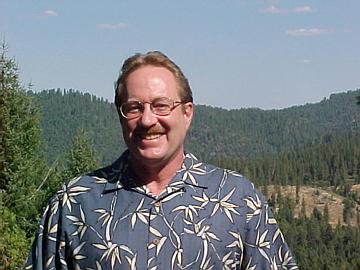Print This Page
|
Click to View All Speakers
|

Jay Gunkelman
|
Starting in 1972 with the first State Hospital based biofeedback laboratory, and then specializing in EEG for decades, Jay is an experienced Clinical and research EEG/qEEG specialist and consultant. Author of many scientific papers, and a mounting list of books, his depth of understanding of the mind/brain's function is helpful in communicating the underlying mechanisms and systems of the brain, mind, and consciousness. Jay is a popular lecturer world-wide, and he has occupied leadership positions in the field's professional societies. Now with Q-Pro, an international EEG/qEEG services group, he provides services world-wide.
QEEGJay@sbcglobal.net
510-787-7743
510-688-8298 cell |
|
Workshop #173): how the brain works
The depth and complexity of the real workings of the human brain, as well as the sense of mystery and awe seen when really studying the brain will be covered.
Plenary #190): Mind/Brain/Consciousness
The various EEG frequencies are ascribed to generators, and the timing relationships and dynamics seen as the brain processes information are used to show the implications on the mind-brain problem.
Plenary #8): The neurophysiological substrate of archetype
The functioning of the mind and brain imply memory function, and this short talk will focus on a mechanism for "memory"... from storage and retrieval, to short term and long term memory. The neurophysiological underpinnings of memory contain within the cognitive neuroscience some direct implications regarding a mechanism for archetypal memory. This talk will attempt to communicate some of the mystery and awe that are inherent to real neuroscience.
Details:
Workshop #173): how the brain works
Beginning with the anatomy and physiology undelying the genesis of the brain's electrical patterns, we will cover the IFCN's position paper on EEG generators, as well as the structure and function underlying the dymanics of the EEG. This quickly moving talk will cover material in an understandable manner, even though the material is complex.
The traditional EEG bands and metrics will be covered, though the workshop will impart an understanding that transcends the traditional, and allows understanding of the actual functions that these traditional concepts reflect.
The concept of "subtypes" of various DSM categories will be explored, and the more comprehensive "phenotype" approach will be introduced to replace the older ideas of subtypes.
The workshop will differentiate and identify function in the realm of the mind, and that within the realm of the brain's function. These two fundamental systems dynamically interact to provide us with our conscious experience. The current model of mind-brain-consciousness will be the culmination of this short workshop.
The handouts will be via memory stick plug-in (bring your memory stick, or your computer), not paper, to reduce the forestry attrition associated with killing trees to hand off over 300 megabytes of information.
Plenary #190): Mind/Brain/Consciousness
The procesess of the brain during the detection and processing of sensory stimulation will be used as an introduction to the functional neuroanatomy and neurophysiology of the mind-brain. This will use traditional EEG/ERP measures, from the detection of the stimuli, awareness of the atimuli, and the abilty to differentiate various inputs one-from-the-other, to the encoding of the information into memory will all be reviewed.
The implications of these measures on the concepts of "binding", and the implictions of all these facts on our ability to be conscious beings with free will will be reviewed.
The "spookier" implications of the model will be attended to, unlike the prior talks based on these materials. Archetypal memory, transpersonal communication, holographic/holonomic theory, and even which came first... the mind or the brain... will all be covered in this rapidly paced romp through the neurosciences.
Plenary #8): The neurophysiological substrate of archetype
The EEG correlates of episodic recall and semantic memory imply two separate though interacting systems. These two systems each have their own characteristic operational frequencies, with one being fronto-limbic, and theta based, and the other one parietally based in the alpha band. Work from Wolfgang Klimesch's lab in Salzburg Austria has documented the phasic frontal midline theta associated with memory activation and retrieval, as well as documenting the nature of the semantic memory and the effect of the individual alpha frequency (IAF) "tuning" on sematic recall. The slower the alpha frequency (IAF), the worse the semantic memory performance
Recent neurofeedback studies by Simon Hanselmayr showing improvement of memory with the re-tuning of the alpha frequencies is powerful evidence of a causal link between the alpha frequencies and semantic memory performance. These findings have important implications for brain brightening in the ever aging population, especially in light of the correlation between slower alpha frequencies and aging, and the associated memory decline.
The phase locking of alpha and theta, and the interaction of these two separate systems is thought to be at the neurophysiological basis of the event related potential (ERP), and is one of the basic tennents of the model of consciousness being taught currently.
Underlying all this memory processing is the basis of the memory storage. Sensory information has been shown to be encoded as a Gabor function using indwelling microelectrode recordings. This points directly to an "interference pattern" based encoding and retrieval system, or the "holographic" nature to memory storage.
There are implications for superconductivity and/or superfluidity being required for our memory's proper function, and within this there are implications for a neurophysiological basis to exist underlying archetypal memory, and the mechanisms for communication at an archetypal level.
Contact Info:
Jay Gunkelman
879 Redwood Ct.
Crockett, California 94525
phone: 510-787-7743
cell: 510-688-8298
|
Click to View All Speakers
|
